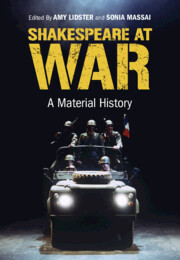Book contents
- Shakespeare at War
- Shakespeare at War
- Copyright page
- Contents
- Figures
- Notes on Contributors
- Acknowledgements
- Note on the Text
- Introduction
- Chapter 1 ‘The Truth for Which We Are Fighting’
- Chapter 2 The Seven Years’ War (1756–1763) and Garrick’s Shakespearean Nationalism
- Chapter 3 Revolutionary Shakespeare
- Chapter 4 Hamlet Mobilized
- Chapter 5 Shakespeare, the North-West Passage, and the Russian War
- Chapter 6 ‘Now for Our Irish Wars’
- Chapter 7 Shakespeare and the Survival of Middle England
- Chapter 8 Ellen Terry Stars at the Shakespeare Hut
- Chapter 9 The 1916 Shakespeare Tercentenary at № 1 Camp in Calais
- Chapter 10 Shakespeare Does His Bit for the War Effort
- Chapter 11 Germanizing Shakespeare during the First World War
- Chapter 12 Readers and Rebels
- Chapter 13 Forgotten Histories
- Chapter 14 ‘Now Good or Bad, ’tis but the Chance of War’
- Chapter 15 ‘Precurse of Feared Events’
- Chapter 16 But What Are We Fighting For?
- Chapter 17 Henry V and the Battle of Powerscourt
- Chapter 18 Unser Shakespeare in Nazi Germany
- Chapter 19 Framing the Jew
- Chapter 20 G. Wilson Knight’s ‘Royal Propaganda’ in ‘This Sceptred Isle’ (1941)
- Chapter 21 Shakespeare’s Desert Camouflage
- Chapter 22 ‘May I with Right and Conscience Make This Claim?’
- Chapter 23 Henry V and the Invasion of Iraq
- Chapter 24 Who Pays the Price?
- Chapter 25 ‘Mere Prattle, without Practice, Is All His Soldiership’
- Chapter 26 ‘Thou Hast Set Me on the Rack’
- Afterword
- Notes
- Index
Chapter 12 - Readers and Rebels
Ireland, Shakespeare, and the 1916 Easter Rising
Published online by Cambridge University Press: 17 August 2023
- Shakespeare at War
- Shakespeare at War
- Copyright page
- Contents
- Figures
- Notes on Contributors
- Acknowledgements
- Note on the Text
- Introduction
- Chapter 1 ‘The Truth for Which We Are Fighting’
- Chapter 2 The Seven Years’ War (1756–1763) and Garrick’s Shakespearean Nationalism
- Chapter 3 Revolutionary Shakespeare
- Chapter 4 Hamlet Mobilized
- Chapter 5 Shakespeare, the North-West Passage, and the Russian War
- Chapter 6 ‘Now for Our Irish Wars’
- Chapter 7 Shakespeare and the Survival of Middle England
- Chapter 8 Ellen Terry Stars at the Shakespeare Hut
- Chapter 9 The 1916 Shakespeare Tercentenary at № 1 Camp in Calais
- Chapter 10 Shakespeare Does His Bit for the War Effort
- Chapter 11 Germanizing Shakespeare during the First World War
- Chapter 12 Readers and Rebels
- Chapter 13 Forgotten Histories
- Chapter 14 ‘Now Good or Bad, ’tis but the Chance of War’
- Chapter 15 ‘Precurse of Feared Events’
- Chapter 16 But What Are We Fighting For?
- Chapter 17 Henry V and the Battle of Powerscourt
- Chapter 18 Unser Shakespeare in Nazi Germany
- Chapter 19 Framing the Jew
- Chapter 20 G. Wilson Knight’s ‘Royal Propaganda’ in ‘This Sceptred Isle’ (1941)
- Chapter 21 Shakespeare’s Desert Camouflage
- Chapter 22 ‘May I with Right and Conscience Make This Claim?’
- Chapter 23 Henry V and the Invasion of Iraq
- Chapter 24 Who Pays the Price?
- Chapter 25 ‘Mere Prattle, without Practice, Is All His Soldiership’
- Chapter 26 ‘Thou Hast Set Me on the Rack’
- Afterword
- Notes
- Index
Summary
On 26 April 1916, British authorities imposed martial law throughout Ireland in the wake of the Easter Rising, an insurgent paramilitary movement that had seized control of strategic landmarks throughout Dublin and proclaimed an independent Irish republic. On 27 April, the day after the announcement of the military curfew, an editorial in The Irish Times urged citizens to turn their ‘enforced domesticity’ to intellectual advantage by reading Shakespeare by the fireside. Why would The Irish Times suggest that Dubliners brush up their Shakespeare while gunfire and artillery shells shattered the city around them – causing, among other casualties, the fiery destruction of Dublin’s grand and newly constructed Coliseum Theatre? This essay uses the editorial and the short history of the Coliseum to explore the significance of Shakespeare in Ireland – first, within the wartime historical context of the Easter Rising, and then within the broader history of Shakespearean performance and reception in Ireland. It explores the often-fraught relationship of Ireland’s writers and revolutionaries to Shakespeare, from the period leading into the Easter Rising up to the present – notably including Irish director Caroline Byrne’s decision to set her 2016 production of The Taming of the Shrew in Ireland in 1916, as a mediation on the evolving legacies of the Rising and Shakespeare.
Keywords
- Type
- Chapter
- Information
- Shakespeare at WarA Material History, pp. 121 - 128Publisher: Cambridge University PressPrint publication year: 2023

